Speak and understand French better with 5 past participles
May 23, 2023PAST PARTICIPLES - IRREGULAR ONES. “What”?
Ok, it’s ok not to know grammar like the back of your hand, and to be fair, we can get away with knowing very little. Until learning the French language reminds us that we need to know some basics at least.
So without getting super complex, a past participle is the way you change what you DO to what you DID - the ‘did’ is in the past.
I forgive you and I hope you forgive yourself entirely if you are still wondering how to form the past tense in French, get hung up on changing your sentences to the past, and even worse, get lost once French people start talking to you so fast.
It’s ok to have that feeling. But believe me, it’s worse for the rest of the world learning English - our past tense system is a minefield of trip-ups for English language learners. And English is not exactly the slowest language on the planet either!
So, this mini-lesson is to show you some of the most common irregular past participles used in French, with some lovely examples to go along with them. You can sound them out loud with me and practise your French accent, mouth position and be much readier then to hear French people using them.
- What a past participle is
- Help with pronunciation + examples of past participles in action for you to practise
- How articulating the phrases in a French way will help you understand spoken French

What is a past participle?
To start with, a past participle is a piece of element we need for the past. Let’s get more specific. For the past (and other tenses), you may observe 2 types of verbs: the ones with one word and the others with 2 words or parts (and even 3!).
The past participle is usually the last part of the combination. For the past, you will identify it for the pluperfect and the present perfect.
In the following part, you will see how it works in French.
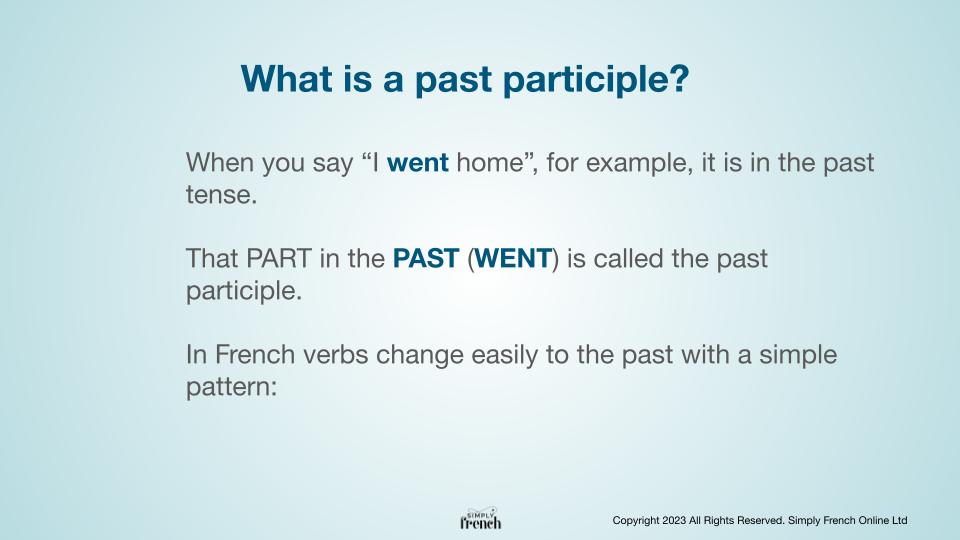
How do you identify a French past participle?
So, you should be able to recognise a past participle in English. Let’s do the same in French. First, the same happens in French where there are 2 parts: the auxiliary and the past participle.
In French, the pluperfect becomes the “plus-que-parfait” and the present perfect is the “passé composé”. The latest is used a lot in everyday conversations.
To start with, you should be able to spot the 3 groups of verbs in French thanks to their infinitives.
The first regular group is composed with ER verbs like: aimer, manger, habiter, parler…
Then the second group gathers IR verbs with an ending of “issons” with the pronoun nous. These are specifics verbs from this group: finir, choisir, agir, grossir…
Finally, the third group is filled with irregular verbs like avoir, être, voir, boire, écrire, prendre…
How do you obtain the past participles? Here are the “regular” patterns:
- ER >>> É
- IR >>> I
- DRE >>> U
With examples, you would see the following:
- ER >>> É >>> aimé, mangé, habité, parlé…
- IR >>> I >>> fini, choisi, agi, grossi…
- DRE >>> U >>> vendu, rendu, entendu, attendu
Of course, there are some exceptions like with the verb PRENDRE and its combinations. There’s a full article about this topic:
The French verb RENDRE and 7 combinations (listening activity)

What does an irregular past participle look like?
As you saw previously, there are regular and irregular past participles. In English, the regular ones have their ending in “ed” and the irregular ones, well…don’t follow any rule!
To make it even more simple, it’s the verb ending with “ed” or the irregular form.
In English, the regular past participles are: worked, studied, booked, ordered, lived, liked…
On the contrary, the irregular past participles don’t follow any rule. Here are some examples: written, read, left, eaten, had, made, known…

Identify some patterns for irregular French past participle.
Time for you to not only learn 5 French past participles but also practice your pronunciation with them. Here they are:
- Faire >>> fait (done/ did)
- Devoir >>> dû (had to)
- Prendre >>> pris (took/ had)
- Avoir >>> eu (had)
- Plaire >>> plu (pleased)
In the following sections, we will be focusing on each of them. Be sure to watch the video and practice along. Let’s dive in!

What is a past participle of the French verb FAIRE?
Faire is an essential French verb you should master because almost all actions require it. It means “to do” and “to make”.
Here are 2 examples for you with the past participle of this verb:
- Qu’est-ce que tu as fait aujourd’hui ? >>> What did you do today?
- Je n’ai rien fait >>> I haven’t done anything.
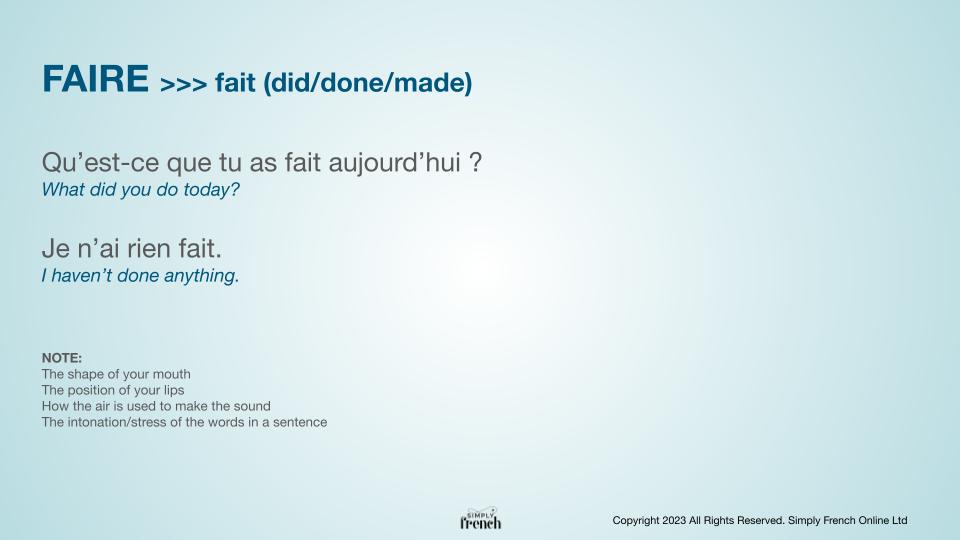
How do you say “had to” in French?
Do you want to express an obligation? Your number 1 French verb for it is devoir. Its past participle is super easy: just 2 letters and an accent: dû.
These are 2 illustrations of it:
- On a dû reporter le rendez-vous à demain. >>> They had to postpone the meeting to tomorrow.
- J’ai dû faire un contrôle médical. >>> I had to have a medical test.

Learn the French past participle of PRENDRE.
Another essential verb you can’t miss: prendre. This multifunctional verb has several meanings and is the equivalent of take and have. What’s its past participle? Answer: pris. It’s an irregular one, so be sure to learn it.
Let me give you 2 sentences:
- Qu’est-ce que tu as pris comme entrée ? >>> What have you chosen for starters?
- J’ai pris note de ce que vous avez dit. >>> I’ve taken into account what you said.
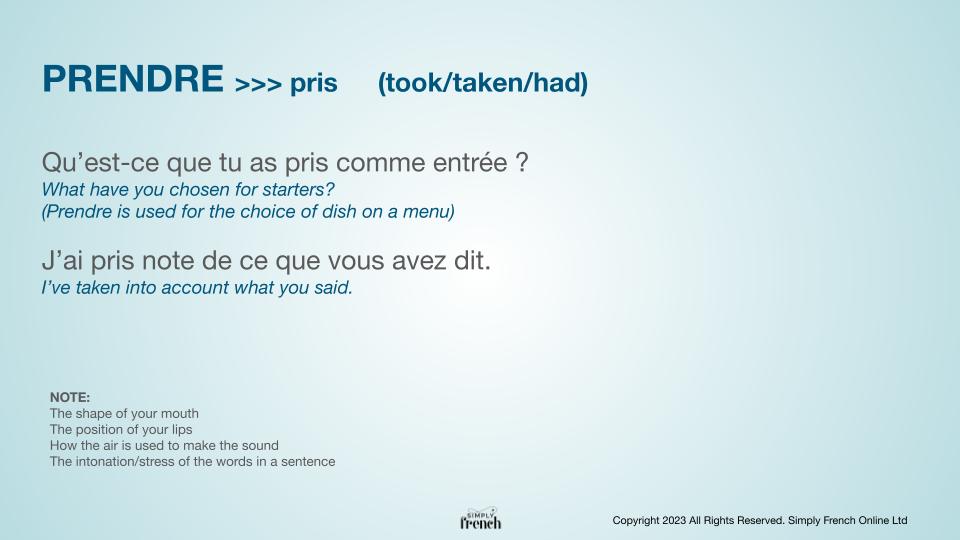
The main French past participle you should know: AVOIR.
If there’s a verb you should know perfectly is avoir meaning to have. Its past participle is super easy with 2 letters but the pronunciation requires some practice: eu.
These are 2 illustrations of it:
- J’ai eu envie d’acheter un peu de chocolat . >>> I felt like buying a bit of chocolate.
- J’ai eu un imprévu. >>> I had something come up.
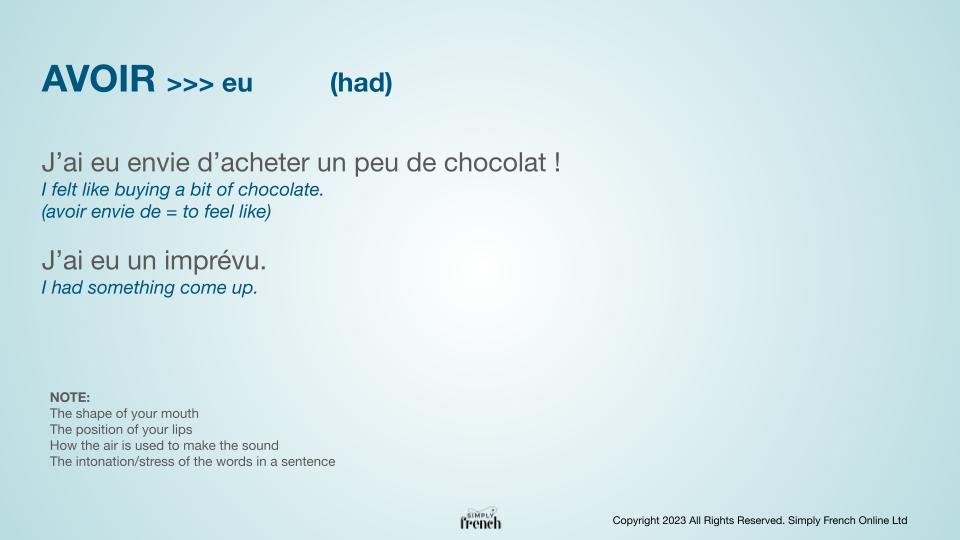
How to say something pleased you in French.
The French verb to please is quite common when it comes to give an opinion on something. Its past participle is funny since it’s the same one for the verb pleuvoir (to rain): plu.
Here are 2 ideas for you:
- Ça vous a plu ?>>> Did you like that?
- Ce qui ne m’a pas plu c’est le froid ! >>> What I didn’t like was the cold!
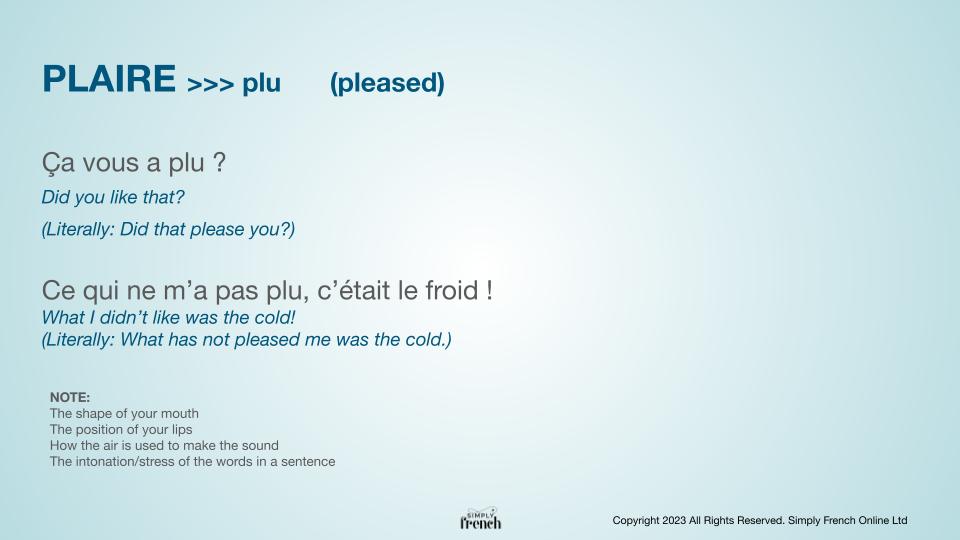
5 French past participle to pronounce French better.
To summarise, we killed two birds with one stone. You’ve seen how to identify and conjugate some past participles but you also practiced your pronunciation with the video.
French past participles are most of the time irregular. Oui, they are numerous but if you build your own sentences with them, it will become natural. You don’t have to know all of them. Only the main ones will suffice.
Once you master them, you can go further with this video the perfect tense.

Being familiar with sounds means you don’t have to process them! Are you willing to record your own examples and send it to me to check? I love receiving messages from students, so go ahead!
Free Masterclass
Learn my 4 step method of how to hold meaningful french conversations the R.E.A.L. way in just 30 minutes a day.
When you signup, we'll be sending you weekly emails with additional free content

